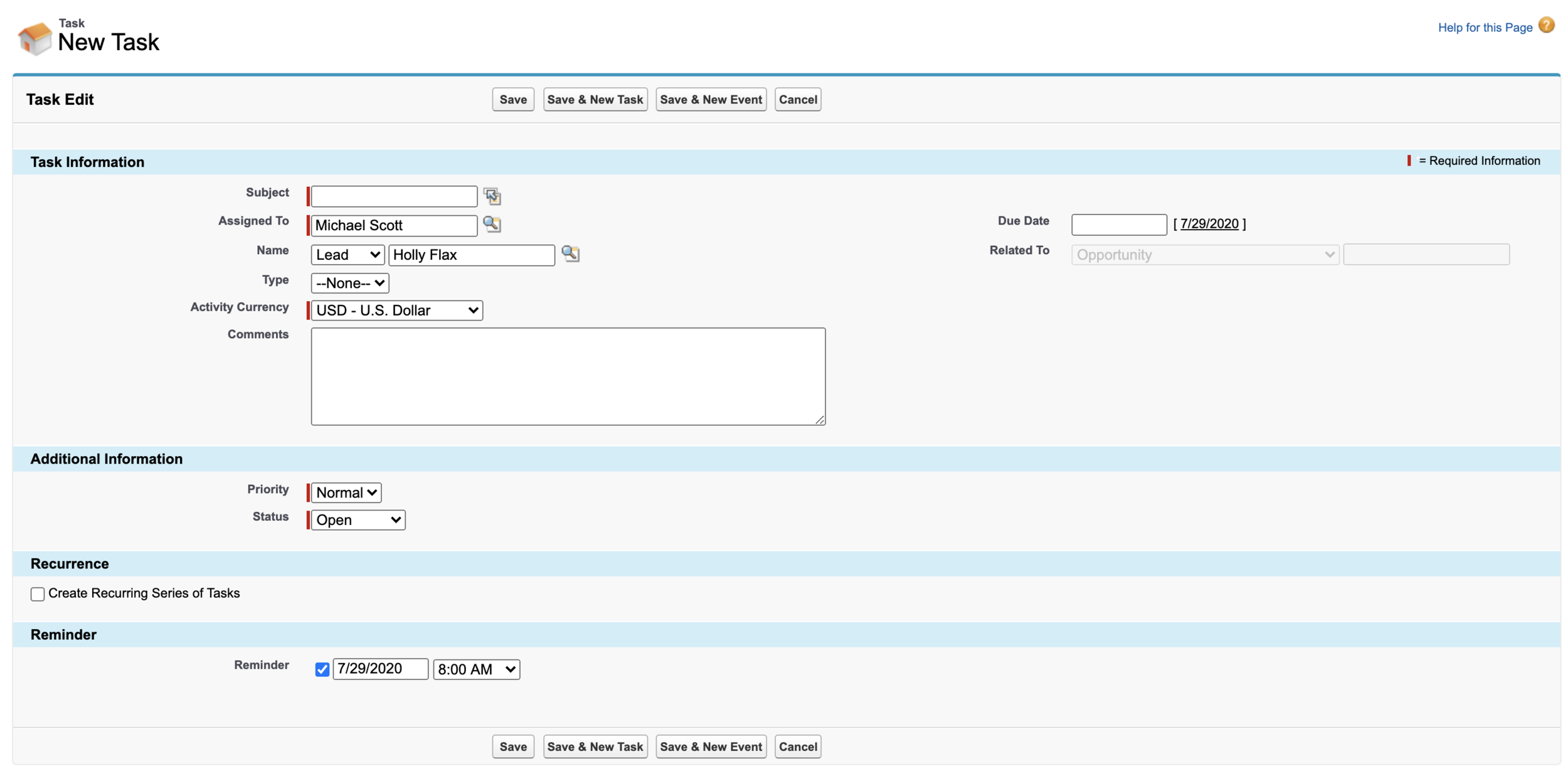Salesforce is an incredibly effective tool that many sales organizations use every day to log information, manage teams, and report on sales data – but the fact that Salesforce is such a big tool, it can be extremely overwhelming to its users.
There are so many things going on, and there’s something for everyone, it’s easy to lose visibility into the things that actually matter. That’s when things start falling through the cracks and your revenue number takes a hit.
For sales reps using Salesforce, that’s where Salesforce tasks come in. As most of you might be familiar with, a Salesforce task looks something like this:

Hundreds of emails, calls, social touchpoints, follow-ups, meetings, and video calls fill up a sales reps day – Salesforce tasks are a great way for sales reps to make sure they are keeping up with each and every one of the activities they need to be in order to move their deals forward.
What is a Salesforce task?
Salesforce tasks are a time-based reminder that for sales reps of the next action they need to take. The next task field should be updated very frequently, almost like a mini to-do list for the rep, and they are particularly helpful when there is a significant amount of time between actions (so you don’t forget about it.)
Some common tasks that sales reps use to make sure they are keeping up with activities on their leads and contacts are:
Task subject: Follow up
Task due date: August 10, 2020
Task comments: Prospect is on vacation and back in the office on August 10th
Task subject: Book a team-wide demo
Task due date: August 14, 2020
Task comments: Send a calendar invite to prospect and their team for the week of August 17-21
Task subject: Prep for team-wide demo
Task due date: August 17, 2020
Task comments: Focus on pain points X, Y, and Z
Task subject: Send pricing quote
Task due date: August 21, 2020
Task comments: Quote for 50-users at $40 per user
Task subject: Book next call
Task due date: August 28, 2020
Task comments: Haven’t heard back from prospect since pricing quote – need to review pricing and determine next steps
Salesforce tasks need to be managed
Salesforce tasks are a great way for sales reps to manage what they need to do each day to move prospects and deals forward, but they need to be managed too. Even if a sales rep is using Salesforce tasks, it doesn’t guarantee that the task will be completed. Salesforce tasks can still get lost in the shuffle, forgotten about, or completed late.
And to make things more complicated, you can create Salesforce tasks from other tools – most notably, sales engagement platforms that sales reps are also using everyday like Outreach or Salesloft. That means more tasks being created and completed from different places, adding to the possibility of a task being lost or forgotten about.
Salesforce task management best practices
In order to have effective Salesforce task management, there are two things you need to track and monitor:
-
No task set – is there a next task set in Salesforce?
-
Overdue tasks – if there is a next task set, is it overdue?
No task set
If there is no task set, it means that the sales rep:
-
isn’t sure what to do next,
-
forgot to create a next task,
-
or is managing things outside of Salesforce – like a notebook or spreadsheet
If the sales rep isn’t sure what to do next, that can be solved with some sales coaching. Otherwise, threre is a good chance the deal will slip through the cracks because there will be nothing to remind them to take the action.
Overdue tasks
If a task is past it’s due date without being completed, it means the sales rep:
-
set the task but didn’t complete it, or
-
completed the task, but didn’t update Salesforce
When a Salesforce task is overdue, it increases the risk of the deal being forgotten and it blocks the sales managers visibility into how the deal is moving. The longer a task is overdue, the more likely it is that it will remain overdue because it probably means the sales rep got busy with other, hotter deals.
Win more deals with effective Salesforce task management
Salesforce is an incredibly effective tool for sales reps, but without proper management, it’s overwhelming. That’s why Salesforce tasks are so important for sales reps to be using each and every day to help sales reps track, manage, and work their deals through the sales process.
But Salesforce tasks can be hard to manage – they can get lost, forgotten about, or ignored. Luckily, managing tasks can be broken down pretty easily, you just need to track two things:
-
If there is a next task set
-
If the next task set is overdue
By tracking and managing those two items, you can ensure that your sales reps are working every deal, that they have a plan to move the deals forward, and that things are being reported in Salesforce in a timely manner.
Tracking tasks automatically
Managing Salesforce tasks is easy and automatic with Varicent Lift's out-of-the-box reporting. And now you can try it out for free with The Sales Rep Grader – a free app for anyone with a Salesforce login to see how your sales team is managing pipeline (including how they are managing Salesforce tasks!)



